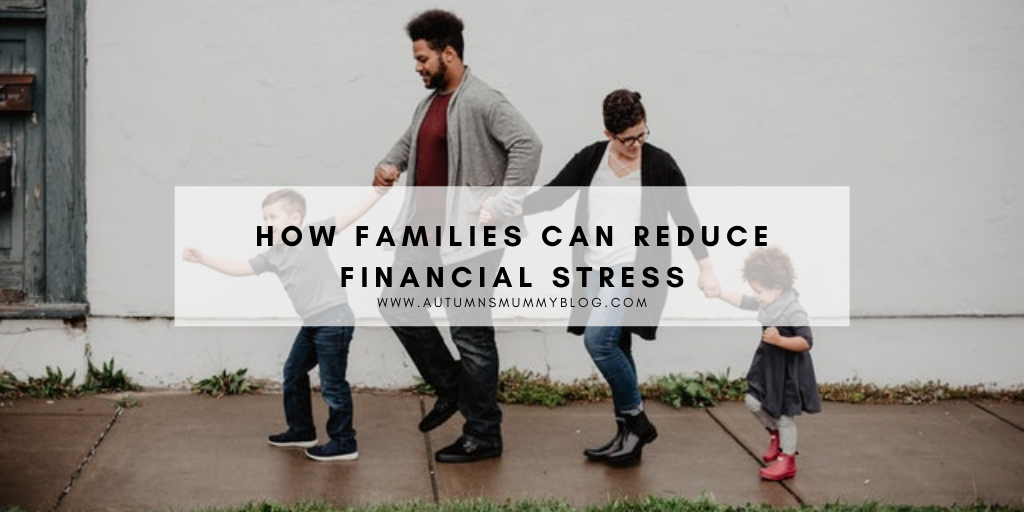Collaborative Post¦ There are many stressful elements in life, but some are more stressful than others. If you’ve got a family, then you’ll know just how stressful it can be to stay on top of all things finance-related. Just when you think you’ve got a solid grasp on things, something pops up that gives you more sleepless nights. While this is very much an unwelcome element of family life, it’s important to remember that there are always things you can do that’ll keep your financial stress to a minimum.
In this blog, we’ll run through some of the most effective tips. Take our advice, and it won’t be long before you’re feeling a lot calmer — and you’ll likely find that your finances are in a much rosier position, too.

Confront Your Financial Landscape
It’s oh so very tempting to avoid difficult moments in our lives. The idea is that if it’s out of sight, then it’s out of mind — and at that point, it ceases to be a problem. Of course, this is flawed thinking. If you’re going to ignore your financial landscape when you know it’s probably not looking all that great, then you can’t be all that surprised if it ends up in a less than perfect state. The better approach is to confront your financial landscape. This is often the most difficult step. Once you know where you are, you can take steps to move forward.
Open Dialogue
Did you know that money is the number one cause of arguments among couples? It’s true. And that’s not all that surprising. When you sense you have some money problems, it can be difficult to watch someone else contribute to that problem. Even though it doesn’t make much sense, we generally prefer to cause our own problems rather than have them caused by someone else. There’s no easy solution to this problem. But there are some things that you can do. For instance, you can look at communicating with your partner. Having an open dialogue about money, including what’s an appropriate spending amount, your concerns, plans for the future, and so forth, can go a long way to easing the pressure.
Where Are the Errors?
It’s likely that you have a reasonably good salary, by most standards (such as what other people around the world earn/what people in the past earned). The issue will be that you’re spending a lot of that money. Of course, there are some expenses that you simply have to make — they’re non-negotiable. However, it’s also possible that you’re making some pretty key financial errors. For example, maybe you’re spending money on unnecessary items. It’s usually only when we dive deep into our finances that we realise that we’re spending far too much money on avoidable expenses. For example, it could be that you’re spending more than you should on petrol or takeout lunches.
The Big Expenses
It is important to take care of the small expenses because they can quickly add up to a large chunk of cash. But it’s even more important to take care of the big expenses. They can obliterate your finances and lead to long-term money difficulties. The amount that you spend on your car or your home will have a massive impact on your financial circumstances, after all. If you’re thinking of buying a home, then be sure to use a loan term calculator. This will tell you exactly how much you’ll have to pay each month to pay off your mortgage. If that figure is too high, then you’ll know that it’s not a smart move. You should also play things safe with the car you decide to buy. There are many appealing finance deals out there that sound like a good deal, but which actually may not be.
Rainy Day Funds
Everything could be going well with regard to your money situation, but that’s only the case under the current circumstances. If anything out of the ordinary happens, then you might find that you’re suddenly thrust into a difficult situation. To prevent this from happening, it’s important to put away some money into a rainy day fund/emergency fund. This, of course, is not the most exciting way to spend your money, but it is important. If you never need it, then you’ll never need it. But if you do have to meet a big expense, you’ll be extremely happy that you were storing money away, since that’ll mean the expense won’t have a negative impact on your finances.
Limiting Guilt
We tend to think that all the financial stress comes from spending money. But that’s not necessarily true. Sometimes, we feel guilty for spending money even when we shouldn’t. Rather than putting pressure on yourself for spending any money, only question the purchases and expenses that don’t serve you. If you spend money on your family that everyone enjoys and which doesn’t, by itself, cause too much damage to your financial situation, then there’s no need to feel too bad about it.
Get What You’re Entitled To
There’s a lot of help out there for families. But sometimes, you’ll need to actively claim the money, rather than just waiting for it to come to you. For instance, there could be some tax credits that you’re eligible for. You could also potentially be paying too much or be exempt, if you’re a dependent for example. Learn if you can claim yourself as a dependent here. It’s worthwhile investigating what these things are, because they can have a dramatic impact on your financial situation. Also, remember that you shouldn’t be paying for bills for which you are not responsible. If you’ve been involved in an incident on the roads that was not your fault, then be sure to seek compensation. The system exists for a reason!
Learn To Say No
It’s bad enough to put yourself in difficult financial situations. It’s even worse to let someone else cause financial troubles for you. Anyone who has a bunch of friends and family will know that they often have to put their hand in their pocket, to join dinners, buy presents, go on holidays, and so forth. While it can be nice to do all of these things, it’s also true that they can make a bad financial situation even worse. If you wouldn’t spend it without the prompting of someone else, then you should say no. This can sometimes be awkward, but it’s the right approach. This is especially relevant when you’re invited to weddings in overseas destinations since they can cost a lot of money.
Focus on Debt
You’ll have a lot of expenses. But not all of your expenses will be of equal importance. Sometimes, it’s best to prioritise some expenses over others. An example of this would be debt. While not all debt is bad, there are some debts that can have an overly negative impact on your financial situation. For example, the ones that come with high-interest rates. If you have some of those, then work on getting rid of them as soon as possible, since the majority of the money that you spend may just be going towards clearing interest anyway.

Cover Yourself
If there’s one thing that can keep people up at night, it’s the feeling that they’re just one disaster away from being in financial trouble. While you can’t always prevent bad things from happening, you can always choose how well you’re able to deal with those things. In the case of money related matters, it’s all about getting insurance. If you have extensive insurance that protects your house, car, job, and more, then you’ll have an extra piece of peace of mind that you’ll be ok, no matter what happens.
Set Goals
You’ll feel much calmer if it feels like you’re on the right path towards sound financial health. Indeed, you’ll be more likely to accept present financial difficulties if it feels like you’re moving into a better position. A good way to do this is to set goals for yourself. Could you set a target that you want to hit at the end of the year, for instance? You’ll gain a lot of confidence by seeing yourself move in that direction.
General Stress Reduction Tactics
Finally, remember that you can also reduce financial stress by just generally reducing your stress levels. There are plenty of tried and tested methods for keeping stress at bay. For example, you could consider meditating or engaging in a couple of weekly yoga classes. You’ll find that if you’re generally calm, then you’ll be in a better position to handle any kind of stress that comes your way, whether it’s money related or otherwise.
Conclusion
There’s no avoiding the fact that money can be difficult to manage and that it can be a big cause of stress in our lives. But if there’s one thing to know, it’s that it’s always possible to get a firm grip on things. From getting your money situation under control to all-around changing your approach to what’s in your wallet, you can keep stress to a minimum — and you’ll also find that you generally enjoy life more, too.
Disclosure: This is a collaborative post.
